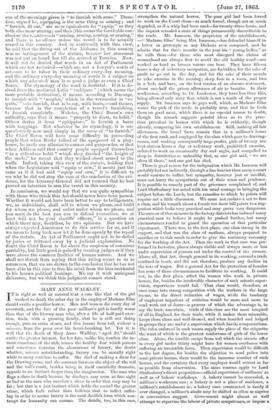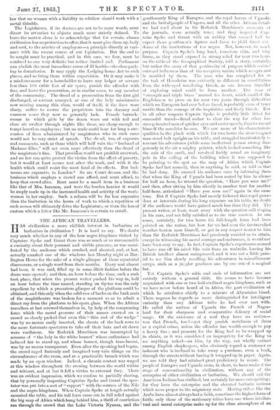MARY ANNE WALK LEY.
IT is as well as natural that a case like that of the girl worked to death the other day in the employ of Madame Elise should excite a peculiar horror. Men and women die every day of overwork, and the fate of the poor milliner's girl is hardly worse than that of the literary man who, after a life of half-paid exer- tion, finds, with a growing family, that he is still not doing enough, puts on extra steam, and dies insane from toil, without a miserere from the press over his heart-breaking lot. Yet it is well that the death of Mary Anne Walkley, "aged 20," should excite the greater interest, for her fate, unlike his, touches the in- most conscience of the rich, rouses the healthy fear which poisons and sometimes restrains the aberrations of luxury, the doubt whether, science notwithstanding, luxury can be morally right while so many continue to suffer. She died of making a dress for the Drawing-room, and the contrast between the object of the toil and the toil's result, besides being in itself essentially dramatic, appeals to an instinct deeper than the imagination. The man who flogs a slave to death because he disobeys may seem at first sight as bad as the man who murders a slave in order that carp may be fat ; but that is a just instinct which holds the second the greater crime, which feels rather than believes that to inflict suffer- ing in order to secure luxury is the moat devilish form which con- tempt for humanity can assume. The details, too, in this case,
strengthen the natural horror. The poor girl had been forced to work on the Court dress—as much forced, though not as much degraded, as if a whip had been used—for twenty-three hours, and the inquest revealed a state of things permanently discreditable to the trade. Mr. Isaacson, the proprietor of the establisliment, —" Madame Elise" being Mrs. Isaacson,—has defended himself in a letter as grotesque as any Dickens ever composed, and he admits that for three months in the year his "young ladies," as he calls them—for those who most disregard the claims of womanhood are always first to avoid the old healthy word—are worked as hard as human nature can bear. They have fifteen hours a day of sedentary occupation, are forbidden for the sake of profit to go out in the day, and for the sake of their morals to take exercise in the evening ; sleep four in a room, and two in a bed; and have, on the best version of an obscure statement, about one-half the prison allowance of air to breathe. In their workrooms, according to Dr. Lankester, they have less than this, being allowed only sixty feet, which is not a tenth of the proper supply. '.Jr. Isaacson says he pays well, which, as Madame Elise wants the pick of the trade, is probably true, and that he feeds- them on good meat, which there is no especial reason to doubt, though his remark suggests painful ideas as to the prac- tices prevalent in houses with which he is evidently, though silently, comparing his own establishment. Still, making all fair allowances, the broad facts remain that in a milliner's house of the first rank, and employed by the class which goes to drawing- rooms, and making consequently large profits, girls of twenty are kept sixteen hours a day at sedentary work, prohibited exercise, ordered to work on occasionally day and night, and compelled to. sleep in dormitories so unhealthy that, as one girl said, " we are often ill there," and one girl has died.
There is good reason for the indignation which Mr. Isaacson will probably feel not indirectly, through a fine heavier than many a court would venture to inflict, but sympathy, however just or needful, must not hurry the sympathetic out of their sense and prudence. It is possible to remedy part of the grievance complained of, and Lord Shaftesbury has acted with his usual courage in bringing the subject before the Lords, but the remedies to which he points will require not a little discussion. We must not enslave a sex to free a class, and his remark about a female ten-hour bill points to a sug- gestion which looks very practical and may prove very dangerous. The success of that measure in the factory districts has induced many practical men to believe it might be pushed further, but many circumstances tended to guard the operation of that particular experiment. There was, in the first place, one class strong in its support, and that was the class of mothers, always prepared to- sacrifice or to risk much in order to give the testimony necessary for the working of the Act. Then the work in that case was per- formed in factories, places always visible and always more or less. undersupervision of persons not under the control of the owners. Above all, that Act, though general in its working, covered a trade confined in locale, and did not, therefore, produce any decline in. the rate of wages. But a general Act for the protection of females. hasnone of those circumstances to facilitate its working. It could not, in the first place, affect the women who work in private' houses, for, besides the intolerable character of such minute super- vision, supervisors would fail. That class would, therefore, at once come into strong competition with the workers in the large rooms, to the direct reduction of wages, while the tendency of employers impatient of criticism would be more and more to send work out of doors—a process of which the advantage is, to. say the least, uncertain. Girls of this class are the most tempted of all in England, for their trade, while it makes them miserable, keeps them clean and well dressed, and when boarded and lodged in groups they are under a supervision which has its compensations.- The rules enforced in such rooms supply the place of the etiquette' the want of which is the greatest misfortune of girls of the lower class. Alone, the terrible escape from toil which the streets offer to every girl under thirty might have for women overborne with suffering an irresistible force. Then supervision would be difficult to the last degree, for besides the objection to send police into semi private houses, there would be the immense number of such houses, and the certainty that every employer would retreat as far as possible from. observation. The same reasons apply to Lord Shaftesbury's direct proposition—official supervision of milliners' as, well as of bakers' workshops. A bakery cannot be concealed, a milliner's workroom can ; a bakery is not a place of residence, a milliner's establishment is ; a bakery once constructed is rarely if ever changed, a milliner's abode may be shifted as often as caprice or convenience suggest. Government might almost as well attempt to supervise the labour of private sempstresses, or impose a law that no woman with a liability to whitlow should work with a metal thimble.
The Legislature, if its decrees are not to be mere words, must direct its attention to objects much more strictly defined. To leave the matter alone is to acknowledge that for certain classes civilization has no protection to offer, that it must give them up, body and soul, to the avarice of employers—a principle directly at vari- ance with the recent course of our legislation. But the end to be sought must be practical, and in this case, we fear, must be confined to one very definite but rather limited end. Parliament can abolish the most immediate cause of ill-health—the close pack- ing in dormitories. It may apply the Lodging-house Act to such places, and so bring them within supervision. Or it may make it a misdemeanour for a householder to leave any lodger or servant less than 700 cubic feet of air space, punish the offender with fine, and leave the prosecution, as in similar cases, to any member of the community. The dread of a prosecution from the first girl discharged, or servant annoyed, or one of the lady missionaries now moving among this class, would of itself, if the fines were sharp, suffice to coerce the proprietors into the decency and common sense they now so generally lack. Female barrack- rooms in which girls by the dozen worn out with toil and close air swelter through nights like these, are cheap enough to tempt heartless employers ; but no trade could bear for long a suc- cession of fines administered by magistrates who in such cases would not be very strict of speech. The dread, too, of exposure and comments, such as those which will half ruin the "husband of Madame Elise," will act even more effectively than the dread of the magistrate's fine. That provision would not prohibit overwork, and no law can quite protect the victim from the effect of poverty, but it would at least secure rest after the work, and with it the health which could resist the most fatal of its effects. But bed- rooms are expensive in London ? So are Court dresses, and the business which employs a crowd can afford, and must afford, to keep that crowd alive. Rent must be a small item in a business like that of Mrs. Isaacson, and were the burden heavier it would be amply made up in the increased health and activity of the work- women in her employ. Such a reform will be far less expensive than the limitation in the hours of work to which a repetition of such scenes will ultimately drive the Legislature, or than the loss of custom which a letter like Mr. Isaacson's is certain to entail.































 Previous page
Previous page